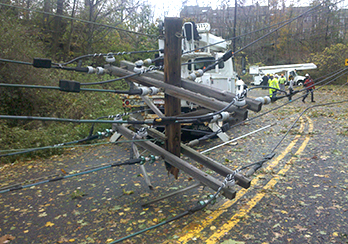After a Storm
Cleaning Up After a Storm
Once the weather clears, it's time to take stock of the damage and make a plan to resume normal life.
Storms Leave Quite a Mess Behind
Downed wires should always be considered “live.” Stay as far away as possible from them, and if possible, keep others, children, and pets away from the wire. Do not drive over or stand near any downed wire. To report a downed wire, call PSEG Long Island’s 24-hour Electric Service number at 800-490-0075 or call 911.
- Avoid parking near downed wires, if possible. Do not drive over them, either, because they can get tangled easily in your vehicle.
- Use extreme caution if you're using a generator during a power outage. Keep generators outside, follow the manufacturer's instructions, and never connect a generator to your home's electrical system.
- Use battery-operated lights and flashlights rather than candles, which are a fire hazard.
- State law requires that if the traffic lights or controls are out of service or malfunctioning when you approach an intersection, you must come to a stop as you would for a stop sign. You must then proceed according to the rules of right of way, unless you are directed to proceed by a traffic officer.
Food Safety
- Keep your refrigerator and freezer doors closed when the power goes out. Unopened refrigerators keep food cold and safe for a few hours.
- Half-full freezers hold food safely for up to 24 hours; full freezers preserve food between 36 and 48 hours.
- Extend food storage by packing milk, dairy products, meats, fish, poultry, eggs, and other foods in a cooler surrounded by ice.
- To determine if the food in your freezer has thawed and re-frozen, store an ice cube in a plastic bag before the power goes out. If the cube melts from its original shape, you'll know power was off for an extended time and your frozen food isn't safe.
Generator Safety
- Never use a generator, pressure washer, or any gasoline-powered engine inside your home, basement, or garage or less than 20 feet from any window, door, or vent. Use an extension cord that is more than 20 feet long to keep the generator at a safe distance.
- Install carbon monoxide (CO) alarms in your home to help detect these fumes.
- Never connect generators to other power sources like power lines. Utility workers who don't know that a generator is connected are in danger of electrocution.
- Use your generator for emergency standby power only - and just for short periods of time. When it's time to refuel, turn it off and let it cool down first.



















